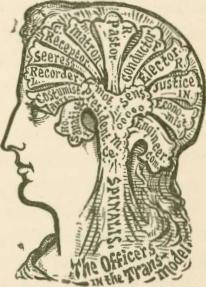50 HISTORIC GROWTH OF MAN.
transport this food to different parts of the country, and they lead us to form agricultural societies which may spread the best knowledge of food culture.
The passion of sex-love leads to the institution of marriage, and with parental love originates the family. The family itself, in early ages, increases to a tribe, and these tribes at last become a nation. The religious faculties require some kind of religious institutions; and the organs of rulership or ambition demand fixed forms of government and public life. The faculties of labor can only be satisfied by organized methods of industry ; those of wealth require a public treasury with just economic conditions, and the organs of commerce demand public highways and trade. The organs of perception lead to organized workshops, factories and fine arts; those of science lead to the higher institutions of learning, while those of culture require conditions for universal improvement and happiness. All this analysis shows that back of each institution stands some mental faculty as its producing cause and as its constant
source of activity and power.
Men follow a natural impulse when they choose offi
cers and form departments
to represent and supply
these collective wants. And
it is self-evident that they
should all be represented in
a complete social organism.
OUR CONSCIOUS WANTS
always start in the brain. If we should cut off the
THE WANTS OF SOCIETY. 51
nerves that connect the stomach with the brain, then we should not be conscious that we needed food. We should not be hungry. And so of all parts of the body. A million of nerve fibers reach from these parts and connect them in responsive action with definite parts of the brain. Each muscle depends for its stimulus of movement upon some fibers of the brain which have the same direction as its own. And so of heart, lungs, kidneys and other vital organs. A special part of the brain is in close sympathy with each one. It therefore follows that in representing the organs of the brain by officers of society we also make direct provision for all bodily wants.
For convenience of reference, we condense in a table below the twelve groups of collective wants.
1st. Institutions based on the collective wants of
man.
2d. Art, beauty and utility in harmonic homes. 3d. Our unity with cycles, seasons and dates. 4th. Science with inspiration the measure of truth. 5th. Personal, social and physical culture. 6th. Dual work and offices for the two sexes. 7th. Religion as the responsive unity of all life. 8th. Members grouped by character in twelve
departments.
9th. All officers chosen or deposed by election. loth. Organized industries; assurance against
want.
iith. Collective ownership for things of collective
use.
12th. Equity, peace and unity between nations.
